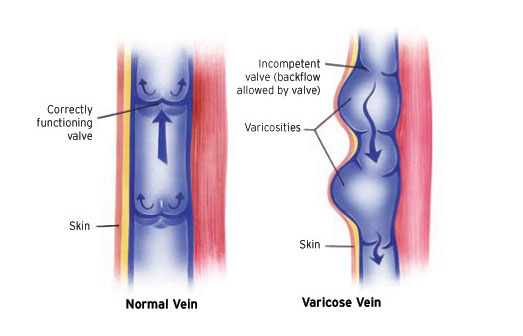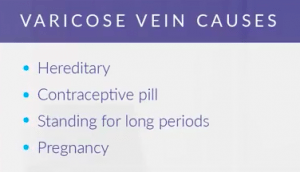Although knowing the exact cause of your varicose veins can be difficult to pinpoint, many of the varicose veins symptoms will cause significant discomfort and are therefore much easier to identify. If you are experiencing any aching, heaviness or swelling in your legs – there is a chance your symptoms are due to varicose veins.
First, what are varicose veins?
Veins are responsible for carrying oxygen-rich blood from around the body, back up to the heart. However, when vein valves, or vein walls, become damaged they can lead to Chronic Venous Insufficiency. As well as swelling and skin discolouration, one of the symptoms of CVI is varicose veins. When blood is not able to flow back up to the heart, it begins to reflux or pool, forming twisted, enlarged vessels known as varicose veins.
The below illustration shows the blood flow in healthy veins vs varicose veins:
Why do varicose veins occur?
Did you know that 1 in 3 Australians suffer from varicose veins? Due to the volume of cases, the causes are often varied. We know that lifestyle factors such as diet, exercise and jobs which require extended periods of standing, can contribute to vein damage. Women are particularly vulnerable as both pregnancy and the contraceptive pill can cause varicose veins. But the most common factor is that varicose veins are hereditary.
What are the symptoms of varicose veins?
Varicose veins symptoms can be debilitating. Over time, they may worsen your quality of life by preventing sleep, making it hard to exercise and stand for long periods.
The most common symptoms of varicose veins are:
- Bulging veins. Varicose veins are large, twisted, and lumpy, so they are often easy to pinpoint. However, not every varicose vein will be visible. Some branches may be smaller and sit deeper under the skin.
- Aching legs. When a varicose vein expands, it can trigger the nerves around it, causing a deep, dull ache. Additionally, the problem vein causes circulation issues throughout the area, which may start irritating surrounding tissues. Typically, varicose vein pain will worsen at night.
- Heaviness in the legs, especially at the end of the day. Due to poor circulation, your muscles won’t get the oxygen and nutrients they need, making them fatigued.
- Swelling in the ankles or around the damaged vein/s. The swelling will usually be temporary. However, in some cases, it may become chronic (oedema).
- Skin discolouration. The circulation issues caused by varicose veins can hinder the delivery of oxygen and essential nutrients to the skin. On top of that, blood may start leaking out of the vein, leading to haemoglobin buildup that turns the skin a reddish-brown colour. Hence, you might start noticing skin colour and texture changes.
- Itching, since skin that’s deprived of good circulation will start getting agitated. Down the line, the itch may progress to varicose eczema.
How to relieve varicose vein symptoms
Fortunately, there are some steps you can take to relieve symptoms of pain, itching, swelling, and more. These include:
- Compression stockings to stimulate the calf muscles and boost circulation in the legs
- A diet for varicose veins – i.e, eating plenty of foods that are rich in flavonoids, vitamins, and fibre (as well as avoiding foods high in salt and saturated fats)
- Two good methods to relieve vein pain include applying an ice pack to the area and propping your feet above heart level. These steps will minimise swelling and the pull of gravity and get things moving in the right direction
- Exercises like walking, yoga, and swimming. These activities boost circulation without straining the veins
- A varicose vein massage to break up muscle tension and improve circulation
- You can also try out some varicose vein supplements and creams. Please note, however, that research on the effectiveness of creams is limited. Additionally, supplements won’t be much use if you already get enough of those nutrients in your diet.
- Lastly, you can try some natural remedies like horse chestnut extract and lavender essential oil.
Varicose vein symptoms also tend to worsen in hot weather since the heart has to pump more blood through the body and the veins dilate to cool you down. So, see our tips on cooling down and reducing swelling in the heat.
Remember that every case of varicose veins is different. To find what works best for you, it’s best to mix and match the above remedies.
Remedies vs treatment
You should also note that remedies are not the same as medical treatment. While methods like gentle exercise, elevating the legs, and wearing compression stockings can relieve varicose vein symptoms, they will not address the underlying issue of faulty vein valves. Currently, the only way to do so is through surgical and non-surgical vein treatments.
Is it risky to leave varicose veins untreated?
Every case is different, so it is advised that you discuss your circumstances with a doctor.
Living with the symptoms of varicose veins can be uncomfortable, and in some cases, the discomfort may worsen over time. Additionally, if left untreated, varicose veins can lead to complications like Deep Vein Thrombosis (DVT), eczema, and even ulcers.
Seek expert advice
Once your vein valves have become severely damaged the best course of action is to eliminate the source of the disease – the affected varicose vein. The first step is to book your initial consultation. Your specialist will examine the area visually and by performing an ultrasound scan, make a proper diagnosis and recommend the appropriate procedure.
At the Vein Institute, we specialises in non-surgical varicose vein treatment. Although several traditional surgical techniques are available, our philosophy is to offer minimally-invasive options with the least downtime and disruption for our patients. The procedures we offer include EVA Laser treatment for varicose veins, Ultrasound Guided Sclerotherapy, Venaseal (medical super glue) and Compression Therapy.
To learn more about Chronic Venous Insufficiency treatment options we invite you to contact our varicose vein clinic in Sydney, Melbourne, or Canberra at 13 83467 or to make an appointment.




